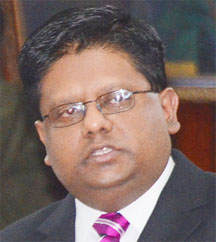Minister of Finance Dr. Ashni Singh on Monday insisted that the Government of Guyana would not have been incurring a single dollar of debt from the Amaila Falls Hydroelectric project and said that the loans guarantee sought in Parliament protects against a default by GPL.
This statement was in response to a letter by Kenrick Hunte entitled ‘Who owns the debt in Amaila’ which appeared in the Sunday Stabroek of August 19, 2013. The letter said that the Government of Guyana in approaching Parliament to increase the debt ceiling amounts to Guyana borrowing the debt.
Hunte said in the letter that the rationale for political and financial guarantees for the project is based on the fact that GPL is currently not a financially viable company that can generate large cash-flows sufficient to pay in full and on time its debts to Amaila. “Evidence suggests that GPL has not been a profitable undertaking for many years and recent audited reports show that it made losses instead of profits, despite its almost monopoly status in the economy,” Hunte said.

“The main implication of this guarantee is that all the debt and risk (US$758.0 million) are solely owned by the government and there is no risk to the lenders: SG, IDB, and CDB. More intriguing is the fact that SG is guaranteed a rate of return of 19 per cent for no risk, while the government has all the risk, but we do not know the rate of return on its investment as it has not been publicized. This needs to be corrected and the calculations made public,” said Hunte in his letter
He said that the fact the approved amount by parliament for the guarantee was less than US$758.0 million and there was no consensus by parliament endorsing the project unreservedly indicates that the risk exposure “was too great for at least one investor who walked away.” Hunte said, “Given these concerns, President (Donald) Ramotar cannot be right about who owns the debt in Amaila.”
In a response on Monday, Singh said “Mr. Hunte is wrong…the borrower or owner of the debt is Amaila Falls Hydro Inc. (AFHI) a privately controlled company that is the Special Purpose Vehicle (SPV) which will undertake the project before handing ownership to the Government of Guyana in 20 years”.
“Government taking a minority stake in AFHI is to reduce the cost of capital and in turn, reduce end-user tariffs, not to incur additional debt through AFHI,” he said.
The Minister said that avoiding debt this way helps to build Guyana’s sovereign credit rating, which in turn enhances Guyana’s attractiveness for future foreign investment. “Moreover, over time, attracting foreign capital and proving that Guyana is investment worthy would mean that the future cost of borrowing for citizens and businesses would go down because capital would become cheaper,” Singh said.
The Minister added that the debt ceiling caters for GPL’s financial obligations to AFHI. Noting that these obligations take two forms, the Minister said that first it is to cover the annual tariff of US$120 million due in the first 12 years of the deal, and secondly, in the event of a default by GPL, AFHI may trigger a termination of the Power Purchase Agreement and a buyout of the project by GPL. “In this case, the guarantee addresses the buyout of GPL of that portion of the purchase price relating to the debt,” he said.
The Minister said that the total outstanding debt on the project including estimates for breakage costs of long term interest rates etc. is estimated at US$650 million or approximately $130 billion.
“It is important to emphasise that the guarantee is only triggered if GPL does not make its payments and therefore defaults on its obligations. The guarantee cannot be triggered by non-performance of AFHI. A buyout would result in the project asset being owned by Guyana with no further payment or obligations,” the Minister said.
The Minister pointed out that GPL will not be responsible for construction risks or operating risks of the Amaila project. “These risks are borne by AFHI and its investors – both debt and equity,” said Singh. “GPL’s risk is largely after the project is built and for payment obligations associated with the delivery of power. Additionally, GPL is responsible for actions that cause AFHI not to perform or for certain political events – Political Force Majeure,” the Minister said.
“In summary, Government is not committing to any debt with the performance guarantee issued to AFHI for the benefit of its lenders (CDB and IDB). GPL and Government of Guyana are not taking the construction and operating risks – these are being borne by AFHI,” he said.
The back and forth arguments over the Amaila project are fast becoming academic amid signs that the deal has collapsed and cannot be salvaged by any of the ongoing discussions.





